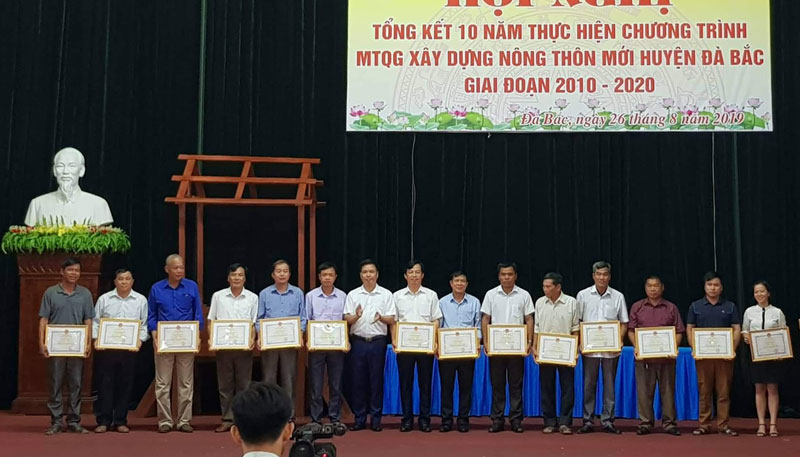
(HBO) - The People’s Committee of Da Bac district held a conference to review the 10 years of the National Target Programme on New-Style Rural Area Building for 2010-2020.
After the 10
years, Da Bac district has achieved many remarkable results, with infrastructure
system for socio-economic development upgraded; and effective production
development models expanded.
Socio-cultural, education and healthcare work have achieved positive changes,
security-defence maintained, and local’s living standard improved.
In 2019, the
district’s per capita income is estimated to reach 26.5 million VND; the rate
of poor household is 33 percent and that of trained lalourer, 49.16 percent.
The rate of
people having health insurance amounts over 90 percent, and the percentage of
households having access to clean water in the district is 96 percent.
There has been one commune in the district recognized as new-style rural area.
Meanwhile, two others are submitting to the provincial People's Committee for
consideration and recognition of the title, 10 have met from 10 to 14 criteria;
and six achieved 8 - 9.
 Official
of the district People’s Committee presents certificates of merits to outstanding
individuals in the new-style rural areabuilding movement
in 2010-2020.
Official
of the district People’s Committee presents certificates of merits to outstanding
individuals in the new-style rural areabuilding movement
in 2010-2020.
For 2021-2030, the district
has set a target of promoting sustainable and comprehensive economic
development, upgrading and building modern and concerted infrastructure
systems, and improving the living conditions of local people.
Attention will be paid to ensuring rural security-politics and social order and
safety.
The district also aims to have 13 out of the 19 communes recognized as
new-style rural areas through implementing six groups of measures.
In Lac Thuy district, communes have been succeeded in promoting their One Commune-One Product (OCOP) products while others are still struggling to position their typical farming products in market. Some communes in the district still fail to have their products met OCOP programme’s requirements, while others have seen their certifications expired.
The inspectorate agency of Hoa Binh province has issued Official Dispatch No. 1090/TTr-PCTN to provincial departments, agencies, localities, business associations, enterprises, and investors regarding measures to improve informal component indexes of the Provincial Competitiveness Index (PCI).
Hoa Binh is taking concrete steps to improve its investment environment, with a strong focus on supporting businesses, settling obstacles for strategic investors, and creating opportunities for robust development in the coming years.
Under the blazing early summer sun, the construction site of Nhuan Trach Industrial Park (IP) in Luong Son district is abuzz with activities from dawn to dusk, a testament to the determination of the investor to meet their construction targets on schedule.



 Official
of the district People’s Committee presents certificates of merits to outstanding
individuals in the new-style rural areabuilding movement
in 2010-2020.
Official
of the district People’s Committee presents certificates of merits to outstanding
individuals in the new-style rural areabuilding movement
in 2010-2020.